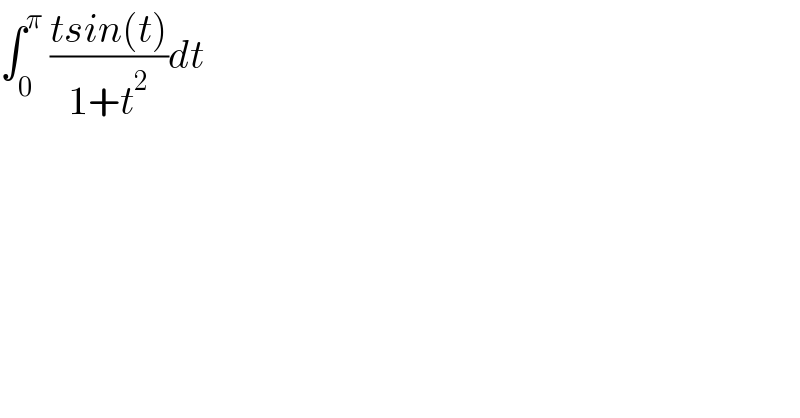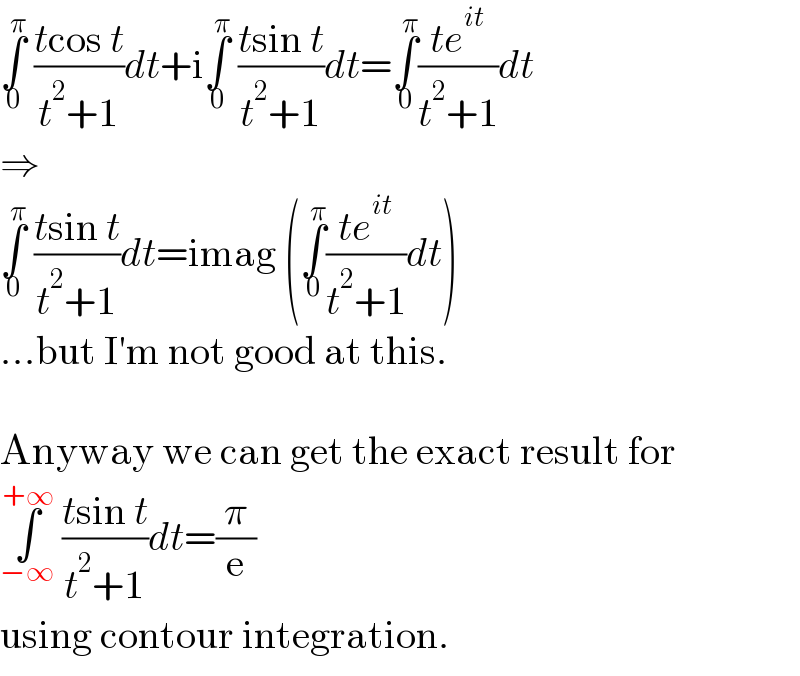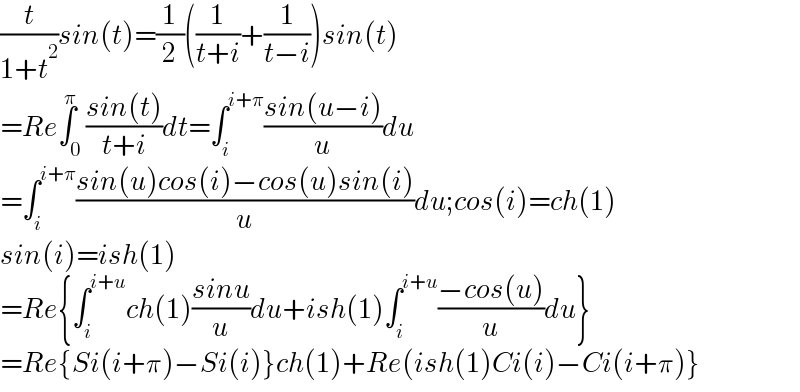
Question Number 210326 by Shrodinger last updated on 06/Aug/24

$$\int_{\mathrm{0}} ^{\pi} \:\frac{{tsin}\left({t}\right)}{\mathrm{1}+{t}^{\mathrm{2}} }{dt} \\ $$
Commented by Spillover last updated on 06/Aug/24

$${i}\:{got}\:\mathrm{1}.\mathrm{6583}\:\:{is}\:{it}\:{right}? \\ $$
Commented by Shrodinger last updated on 06/Aug/24

$${no}\:{sir}\:\mathrm{0},\mathrm{20}... \\ $$
Commented by Ghisom last updated on 07/Aug/24

$$\approx.\mathrm{841492} \\ $$
Commented by Frix last updated on 07/Aug/24

$$\underset{\mathrm{0}} {\overset{\pi} {\int}}\:\frac{{t}\mathrm{cos}\:{t}}{{t}^{\mathrm{2}} +\mathrm{1}}{dt}+\mathrm{i}\underset{\mathrm{0}} {\overset{\pi} {\int}}\:\frac{{t}\mathrm{sin}\:{t}}{{t}^{\mathrm{2}} +\mathrm{1}}{dt}=\underset{\mathrm{0}} {\overset{\pi} {\int}}\frac{{te}^{{it}} }{{t}^{\mathrm{2}} +\mathrm{1}}{dt} \\ $$$$\Rightarrow \\ $$$$\underset{\mathrm{0}} {\overset{\pi} {\int}}\:\frac{{t}\mathrm{sin}\:{t}}{{t}^{\mathrm{2}} +\mathrm{1}}{dt}=\mathrm{imag}\:\left(\underset{\mathrm{0}} {\overset{\pi} {\int}}\frac{{te}^{{it}} }{{t}^{\mathrm{2}} +\mathrm{1}}{dt}\right) \\ $$$$...\mathrm{but}\:\mathrm{I}'\mathrm{m}\:\mathrm{not}\:\mathrm{good}\:\mathrm{at}\:\mathrm{this}. \\ $$$$ \\ $$$$\mathrm{Anyway}\:\mathrm{we}\:\mathrm{can}\:\mathrm{get}\:\mathrm{the}\:\mathrm{exact}\:\mathrm{result}\:\mathrm{for} \\ $$$$\underset{−\infty} {\overset{+\infty} {\int}}\:\frac{{t}\mathrm{sin}\:{t}}{{t}^{\mathrm{2}} +\mathrm{1}}{dt}=\frac{\pi}{\mathrm{e}} \\ $$$$\mathrm{using}\:\mathrm{contour}\:\mathrm{integration}. \\ $$
Commented by mahdipoor last updated on 07/Aug/24

$$ \\ $$$$\mathrm{This}\:\mathrm{site}\:\mathrm{can}\:\mathrm{solve}\:\mathrm{many}\:\mathrm{integrals}\:\mathrm{for} \\ $$$$\mathrm{example}\:\mathrm{it}\:\mathrm{has}\:\mathrm{solved}\:\mathrm{this}\:\mathrm{integral}\:\mathrm{with}\:\mathrm{the} \\ $$$$\mathrm{help}\:\mathrm{of}\:\mathrm{imaginary}\:\mathrm{numbers}\:\mathrm{and}\:\mathrm{ci}\:\mathrm{and}\:\mathrm{si} \\ $$$$\mathrm{functions}. \\ $$$$\mathrm{www}.\mathrm{integral}−\mathrm{calculator}.\mathrm{com} \\ $$
Commented by Frix last updated on 07/Aug/24

$$\mathrm{Yes},\:\mathrm{I}\:\mathrm{also}\:\mathrm{found}\:\mathrm{this}\:\mathrm{site}\:\mathrm{but}\:\mathrm{there}'\mathrm{s}\:\mathrm{no} \\ $$$$\mathrm{useable}\:\mathrm{exact}\:\mathrm{solution},\:\mathrm{we}\:\mathrm{must}\:\mathrm{approximate} \\ $$$$\mathrm{at}\:\mathrm{the}\:\mathrm{end}. \\ $$
Answered by Berbere last updated on 08/Aug/24

$$\frac{{t}}{\mathrm{1}+{t}^{\mathrm{2}} }{sin}\left({t}\right)=\frac{\mathrm{1}}{\mathrm{2}}\left(\frac{\mathrm{1}}{{t}+{i}}+\frac{\mathrm{1}}{{t}−{i}}\right){sin}\left({t}\right) \\ $$$$={Re}\overset{\pi} {\int}_{\mathrm{0}} \frac{{sin}\left({t}\right)}{{t}+{i}}{dt}=\int_{{i}} ^{{i}+\pi} \frac{{sin}\left({u}−{i}\right)}{{u}}{du} \\ $$$$=\int_{{i}} ^{{i}+\pi} \frac{{sin}\left({u}\right){cos}\left({i}\right)−{cos}\left({u}\right){sin}\left({i}\right)}{{u}}{du};{cos}\left({i}\right)={ch}\left(\mathrm{1}\right) \\ $$$${sin}\left({i}\right)={ish}\left(\mathrm{1}\right) \\ $$$$={Re}\left\{\int_{{i}} ^{{i}+{u}} {ch}\left(\mathrm{1}\right)\frac{{sinu}}{{u}}{du}+{ish}\left(\mathrm{1}\right)\int_{{i}} ^{{i}+{u}} \frac{−{cos}\left({u}\right)}{{u}}{du}\right\} \\ $$$$={Re}\left\{{Si}\left({i}+\pi\right)−{Si}\left({i}\right)\right\}{ch}\left(\mathrm{1}\right)+{Re}\left({ish}\left(\mathrm{1}\right){Ci}\left({i}\right)−{Ci}\left({i}+\pi\right)\right\} \\ $$
Commented by hardmath last updated on 11/Aug/24

$$ \\ $$Dear professor, your solutions are perfect
